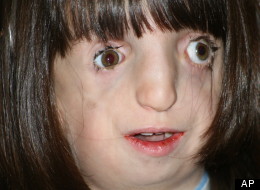Clara Beatty, Girl With Treacher Collins Syndrome And Deformed Face, Learns To Navigate World.
This week saw another news story about a child born with a facial difference who almost did not come into the world. Clara Beatty, age 9, has Treacher Collins Syndrome (“TCS”), a craniofacial disorder with a known genetic cause. It frequently causes hearing problems (ranging from hearing loss to total deafness) and breathing difficulties caused by a narrow airway. It does not typically have neurological or cognitive effects, and there are very successful people living productive lives with TCS.
Clara was almost not Clara because her parents (they were living in Belgium at the time) were told by doctors that most people in their situation abort. When is it ever ethical for doctors to provide “ultimate advice” like this, as opposed to simply providing the parents with information about the condition (which is plentiful in the Internet age)?
You may be surprised to find out that ethical or not, it happens regularly, all over the world. This is a direct function of the inherent paternalism in our system of medicine — the patient is incapable of grasping the full import of the diagnosis, so choices must be made for the patient.
I often tell people that the one upside to not knowing a thing about our son’s condition before his birth was that I didn’t have to listen to people tell me how he would have a life not worth living. Back in the early 2000’s, my husband and I went to a craniofacial conference that included medical personnel and families. There was a series of “providers only” sessions and one of them — get this, was entitled, “The Benefits and Burdens of Pre-Natal Diagnosis.”
An army of doctors and nurses were at a conference with families who knew from first-hand experience what those benefits and burdens were, and rather than hear it from the families, they chose to discuss among the ignorant. This example epitomizes the hubris that is all-too-common in the profession — patients and families have nothing to teach.
The article contains another, implicit issue. The focus of the discussion in the story is on how Clara appears different. The underlying message is that the doctors told Clara’s parents to abort her because she would never look like everyone else. Clara eagerly anticipates her facial growth so she can have some surgery and look more like everyone else, so people will stop asking questions and staring.
What Clara does not know yet is that the staring will never stop. No surgery or series of them will erase the fact that she was born with TCS. Instead of celebrating her triumph, the focus is on her “deformities.” How important is it, really, to look like everyone else? In her memoir, Autobiography of a Face, Lucy Grealy (who later committed suicide) writes:
“I spent five years of my life being treated for cancer, but since then I’ve spent fifteen years being treated for nothing other than looking different from everyone else. It was the pain from that, from feeling ugly, that I always viewed as the great tragedy in my life. The fact that I had cancer seemed minor in comparison.”
Every year, we take our son to a top-rated craniofacial clinic, and every year, some doctor rolls in and makes a suggestion about some possible surgery or procedure that will “normalize his appearance” or will make him “look better.” My response is always the same: this is our son’s face, not ours, and we don’t make the decisions about it. If he asks for surgery, we can discuss it, and he can go ahead with a thought out decision about it, but we and he must do so with a sense of realism — he will always look different from other people, and the fact that is a problem is not his problem to be surgically corrected, but the rest of the world’s problem, which unfortunately, can not be surgically corrected.
